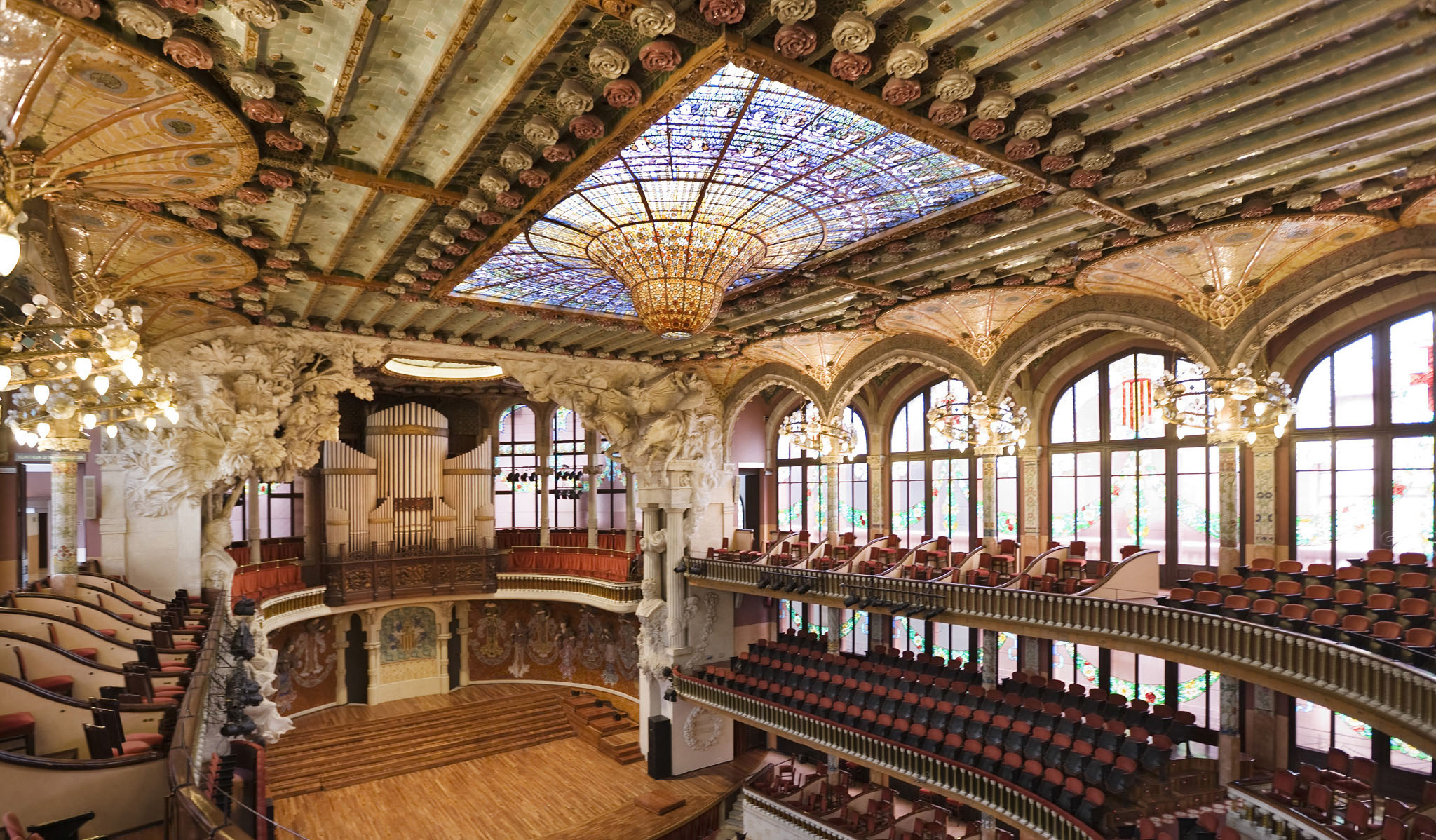
PALAU DE LA MÚSICA CATALANA
Barcelona’s Modernista movement reached its aesthetic peak in Lluís Domènech i Montaner's magnificent 1908 concert hall. The lavish façade is ringed by mosaic pillars, and each part of the foyer in Domènech’s “garden of music,” from banisters to pillars, has a floral motif. The concert hall, whose height is the same as its breadth, is a celebration of natural forms, capped by a stained-glass dome that floods the space with sunlight.
NEED TO KNOW
![]() Sant Pere Més Alt • 90 247 54 85 • www.palaumusica.cat • Guided tours daily, every 30 mins 10am–3:30pm (Easter & Jul: to 6pm; Aug: 9am–8pm); advance booking recommended; mini recital available • Adm $22.50 (check website for discounts); free for under 10
Sant Pere Més Alt • 90 247 54 85 • www.palaumusica.cat • Guided tours daily, every 30 mins 10am–3:30pm (Easter & Jul: to 6pm; Aug: 9am–8pm); advance booking recommended; mini recital available • Adm $22.50 (check website for discounts); free for under 10
- Have a preconcert drink at the Modernista stained-glass bar just beyond the foyer.
- There are special concerts for children preceded by kid-friendly guided tours throughout the year.
- Buy tickets online, or from the box office at C/Palau de la Música 4–6, 90 247 54 85, open 9:30am–9pm Mon–Sat, 9:30am–3pm Sun & two hours before every performance.
1. Stained-Glass Ceiling
Topping the concert hall is a breathtaking stained-glass inverted dome ceiling. By day, sunlight streams through the fiery red and orange stained glass, illuminating the hall.

2. Rehearsal Hall of the Orfeó Català
This semicircular, acoustically sound rehearsal room is a smaller version of the massive concert hall one floor above. At its center is an inlaid foundation stone that commemorates the construction of the Palau.
3. Stage
The semicircular stage swarms with activity–even when no one’s performing. Eighteen mosaic and terracotta muses spring from the backdrop, playing everything from the harp to the castanets.

4. Stained-Glass Windows
Blurring the boundaries between the outdoors and the interior, the architect encircled this concert hall with vast stained-glass windows decorated with floral designs that let in sunlight and reveal the changing time of day.
5. Horse Sculptures
Charging from the ceiling are sculptor Eusebi Aranu’s winged horses, infusing the concert hall with movement and verve. Also depicted is a representation of Wagner’s chariot ride of the Valkyries, led by galloping horses that leap toward the stage.
6. Façade
The towering façade reveals Modernista delights on every level. An elaborate mosaic represents the Orfeó Català choral society, founded in 1891.

7. Foyer and Bar
Modernista architects worked with ceramic, stone, wood, marble, and glass, all of which Domènech used liberally, most notably in the opulent foyer and bar.
8. Busts
A bust of Catalan composer Josep Anselm Clavé (1824–74) marks the Palau’s commitment to Catalan music. Facing him across the concert hall, a stern, unruly haired Beethoven represents the hall’s classical and international repertoire.

9. Lluís Millet Hall
Named after Catalan composer Lluís Millet, this immaculately preserved lounge boasts gorgeous stained-glass windows. On the main balcony outside are rows of stunning mosaic pillars, each with a different design.
10. Concert and Dance Series
Over 500 concerts and dance shows are staged each year, and seeing a show here is a thrilling experience. For symphonic concerts, keep an eye out for the Palau 100 Series; for choral concerts, look out for the Orfeó Català series.

ORFEÓ CATALÀ
The famous choral group Orfeó Català, for whom the concert hall was originally built, performs here regularly and holds a concert on December 26 every year. Book in advance.
